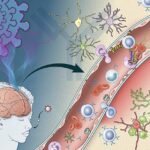Sleep is essential to health, helping the body maintain its typical functions. But researchers are still working to understand the health benefits of sleep and the dangers of poor sleep. One area of interest is the importance of sleep during adolescence.
A recent study published in the Journal of Neurology, Neurosurgery & Psychiatry found that poor sleep in adolescence may increase the risk of developing multiple sclerosis (MS).
The impact of multiple sclerosis
Multiple sclerosisTrusted Source is an autoimmune disorder with damage to the central nervous system. Generally, the symptom onset occurs between the ages of 20 to 40.

People with multiple sclerosis can experience a wide range of symptoms trusted Source. The condition can cause someone to experience increased disability over time. People with multiple sclerosis may have muscle weakness, problems with vision, dizziness, and numbness.
It is unclear why certain people develop multiple sclerosis. It could be related to a response by the body’s immune system. People with a family member with multiple sclerosis may have increased susceptibility to developing the disorder.

This particular study was a case-control study in Sweden. Researchers included 2,075 participants who had multiple sclerosis and 3,164 controls. Researchers asked participants about sleep quality and duration during their teenage years. They divided sleep duration into three categories:
Researchers further asked participants about the difference between when they slept on workdays or schooldays and when they slept on weekends and free days. Finally, researchers asked participants about sleep quality, ranging from very bad to very good.
Importance of sleep for teens

Getting high-quality sleepTrusted Source is essential to healthy growth and development in teenagersTrusted Source. Adequate sleep helps the body heal and improves mental function as well. The American Academy of Sleep Medicine recommends that teens between thirteen and eighteen get 8 to 10 hours of sleep each night.









